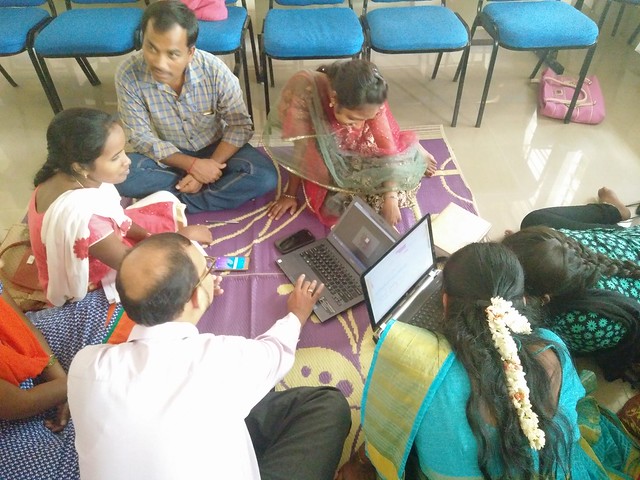Sun, sand and stories: The next StoryWeaver workshop is in Goa!
Posted by Remya Padmadas on February 27, 2017Pratham Books is conducting a special workshop on StoryWeaver - an open source, digital repository of multilingual children’s stories in Goa on 2nd March (Wednesday) and we would like to invite you!

The workshop will cover the following
- A detailed Demo of StoryWeaver – how to navigate and use the platform
- Examples of how educators are using StoryWeaver effectively in their classrooms
- Dedicated work time for participants to try their hands on StoryWeaver
- An opportunity to meet people from similar field and make interesting conversations
If you are,
- a librarian or resource lead looking for curating stories
- an educator in search of interesting ways to introduce concepts to your students
- a storyteller or a reading champion
- someone passionate about children's storybooks in Indian languages ...
... please sign up!
Please note that the seats are limited and only confirmed participants will get a separate email confirming their participation and other logistical details.The workshop will be held from 2:30-5 p.m on 2nd March, Wednesday.
There is no charge to attend the workshop.
We look forward to seeing you! If there are any queries, please email them at [email protected]
Be the first to comment.Presenting StoryWeaver Mobile Translate!
Posted by Pallavi Kamath on October 14, 2020StoryWeaver now offers more than 26,000 storybooks in 280 languages. Thanks to the efforts of our wonderful translator community, we are able to give children access to storybooks in their own language, help protect linguistic heritage, encourage diversity & understanding, and build a culture of reading.
We are continuously looking for ways to support translators, and are delighted to announce the launch of StoryWeaver Mobile Translate!
You can now use StoryWeaver to translate storybooks straight from your phone. With more than 270 supported languages, thousands of curated books, and a simple, intuitive interface, all you have to do is follow 5 steps:
1. Pick your language
2. Pick a book
3. Translate
4. Check your work
5. Publish!
To explore the Mobile Translate experience on your phone, click here.
Happy translating!
comments (7)A tale of two workshops. StoryWeaver visits Mumbai and Mysore.
Posted by Remya Padmadas on June 16, 2017Khyati Datt, a member of our outreach team writes about two of our recent workshops in Mumbai and Mysore.
It’s not often that you have 25 Master Teachers from different walks of life, speaking 5 different languages, living in 4 different states and still engaging with each other and sharing their thoughts.
This was the scene at our recently conducted StoryWeaver Workshop in Mysore. Pratham Education Foundation invited their wonderful Master Teachers for a training workshop in Mysore and we, at StoryWeaver, got the chance to interact with them on the last day of their training. Our facilitators, Mala, Shruthi and Payoshni ensured that the session was multilingual- in Kannada, Tamil, Telugu, English and Hindi.
The beautiful weather at Mysore served as the perfect setting for a 3-hour long session where interesting teacher practices came to light. As the session progressed, we deep dived into the intriguing world of stories and explored how stories open a child’s eyes to a world filled with joy and learning.
The teachers, then, went on to try their hands at StoryWeaver. They decided on themes and explored the platform for five stories/flashcards that talked about their theme. Their biggest takeaway from this exercise was that they can use the platform in their classrooms and combine storytelling with teaching. The second part of their task was getting down to becoming authors! Each group was given a task sheet with a specific theme and encouraged to create a story/flashcard. The most exciting bit was teachers realizing how easy it is for them to create in their regional languages and taking it to their classrooms back home.
We got some great stories from the teachers, who presented their idea for the story and the flow behind it. With so many tongues in the room, everyone promptly translated what was being spoken in the room which ensured language was not a barrier for a fantastic session of idea-exchanges.
A discussion ensued on what are the different ways in which the teachers can use StoryWeaver in the classrooms. It was wonderful to see how the teachers could align their existing classroom ideas with storytelling practices, like by getting their students excited about a topic by narrating them a story about it. Using illustrations as writing prompts, and spotting books for teaching sight words were one of the many ideas that the teachers dwelled on.
We closed the session by showing the participants videos of teachers using StoryWeaver to build a reading culture in their classrooms. The rain shower that followed was the perfect end to a wonderful workshop!
In the previous week, a similar workshop was conducted in Bombay with 30 teachers from Pratham’s ECE wing from Maharashtra and Gujarat. The crackling energy in the room led to a session that was interactive and fun! The teachers came up with ideas to use stories in the classroom to make the lessons engaging and to ensure that the students learn in a different manner. As Smitin Brid, Program Head of Early Childhood Program for Pratham Education Foundation, puts it, “ I’m thankful to the StoryWeaver team for conducting wonderful and useful sessions at Mumbai and Mysore workshops. The key resource people in both these regions have got information about this platform and we’ll ensure continuous engagement with them on using the resources available on StoryWeaver.”
A big thank you to Pratham Education Foundation and its ECE wing for giving us the opportunity to interact with the teachers and their consistent support.
If you are interested in hosting a similar workshop for your organisation, drop us an email on [email protected]
Be the first to comment.
